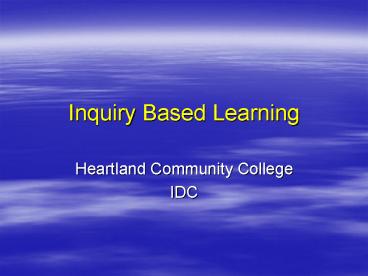Inquiry Based Learning - PowerPoint PPT Presentation
1 / 20
Title: Inquiry Based Learning
1
Inquiry Based Learning
- Heartland Community College
- IDC
2
Inquiry Based Learning
- Definitions
- Inquiry is the process of formulating questions,
organizing ideas, exploring and evaluating
information, analyzing and synthesizing data, and
communicating findings and conclusions. - http//virtualinquiry.com/inquiry/inquiry1.htm
3
Inquiry Based Learning
- Definitions
- A student-centered, active learning approach
focusing on questioning, critical thinking, and
problem-solving. It's associated with the idea
"involve me and I understand." - http//eduscapes.com/tap/topic43.htm
4
Inquiry Based Learning
- Socrates
- Dewey
- J. Richard Suchman-Illinois Studies in Inquiry
5
Inquiry Based Learning
- Key Principles
- Driven by learners questions not teachers
- Constructivist-many ways to construct meaning
from knowledge and imparting skills is more
important than specific information - Metaphor is surfing the web
6
Inquiry Based Learning
- Advantages
- Adaptable to many types of projects
- Hits several learning styles
- Hits multiple skills
- Emphasizes Collaborative Learning
- Focuses on student examples, knowledge,
experiences. - http//www.youthlearn.org/learning/approach/inquir
y.asp
7
Inquiry Based Learning
- Disadvantages
- Instructor gives up some control
- Demands a lot of preparation time and planning
- Perhaps more demands on students to be active
learners - Assessment can be difficult
- Focus moves away from content vs. process
- How we come to know vs. what we know
8
Inquiry Based Learning
- Four Levels of Inquiry
- Controlled
- Guided
- Modeled
- Free
- (School Library Media Activities Monthly, v. 15
no. 6 (February 1999) p. 38-42)
9
Inquiry Based Learning
- Socratic Method and Scientific Method
- Observation
- Hypothesis formulation
- Prediction/Expectation
- Test/Experiment/Analysis
- Report/Reflect/Critique
10
Inquiry Based Learning
- Student Learning Outcomes
- Content of Subject
- Content in Larger Conceptual Framework
- Information Processing Skills
- Nurtured Habits of the Mind
- http//www.thirteen.org/edonline/concept2class/inq
uiry/index_sub2.html
11
Inquiry Based Learning
- Pre-Planning
- What questions do students have?/Topics?
- What will be the time frame?
- What will be the scope?
- Will it tie to other course work and how?
- Learning goals?/Level of Inquiry?
- Media/Resource/Information needs?
- Group work?
12
Inquiry Based Learning
http//www.youthlearn.org/learning/activities/howt
o.asp
13
Inquiry Based Learning
- Question Types
- Factual, Interpretive, Evaluative
- Fact, Why, Imagine
- Blooms Knowledge, Comprehension, Application,
Analysis, Synthesis, Evaluation - Why, How, Which
- Inference, Interpretation, Transfer, Hypothesis
14
Inquiry Based Learning
- Question Types
- Essential, Elaborating, Clarification,
Irrelevant, Irreverent, Hypothetical,
Unanswerable, Strategic, Provocative, Telling,
Divergent, Probing, Inventive, Planning - http//www.fno.org/oct97/question.html
15
Inquiry Based Learning
- Possible Examples from Your Classes
- Questions Worksheet
16
Inquiry Based Learning
- Assessments
- Self-Reflection on process
- Journals
- Traditional Content Based assessments
- Application to new problem/topic
- Observation and Listening
17
Inquiry Based Learning
- Summary Checklist
- Create Learning Objectives
- Create Boundaries or Limit Scope
- Identify Boundaries and Scope in Discipline
- Identify some Specific Content
- Identify Resources needed
- Anticipate Problems and create plan B
- Know your students
18
Inquiry Based Learning
- Summary Checklist (continued)
- Create questions and question types
- Create On-Going Assessments
- Provide Feedback to Students
- Connect Activities to Rest of Course
- Use Advanced Students as Facilitators
- Be Prepared to Scrap this Checklist
- http//www.thirteen.org/edonline/concept2class/inq
uiry/implement_sub2.html
19
Inquiry Based Learning
- References
- http//eduscapes.com/tap/topic43.htm
- http//virtualinquiry.com/inquiry/inquiry1.htm
- (School Library Media Activities Monthly, v. 15
no. 6 (February 1999) p. 38-42) - http//www.youthlearn.org/learning/activities/howt
o.asp - http//www.fno.org/oct97/question.html
20
Inquiry Based Learning
- References
- http//www.thirteen.org/edonline/concept2class/inq
uiry/implement_sub2.html - http//www.inquiry.uiuc.edu/index.php3
- http//www.galileo.org/tips/essential_questions.ht
ml - http//www.questioning.org/Q7/toolkit.html
- http//www.queensu.ca/ctl/goodpractice/inquiry/ind
ex.html































